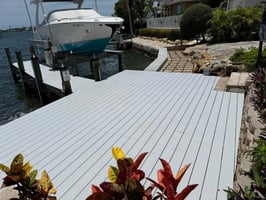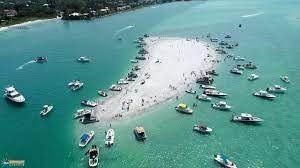Preparing Your Boat for A Hurricane
 A hurricane can wreak havoc on any coast, but your boat can come through the storm in one piece with the proper preparation and precautions. Preparing your boat for a hurricane is more than just putting on a new coat of paint or replacing ropes. It involves careful planning and specific actions when you see a hurricane coming. Fortunately, most hurricanes are predictable to some degree. Depending on where you live, and the time of year, you should be able to find out in advance whether it’s likely that a hurricane will hit your area and approximately when this might happen. If you’re considering buying or selling a boat, this is also important information to factor into your decision-making process. The following tips will help protect your boat from damage during a hurricane.
A hurricane can wreak havoc on any coast, but your boat can come through the storm in one piece with the proper preparation and precautions. Preparing your boat for a hurricane is more than just putting on a new coat of paint or replacing ropes. It involves careful planning and specific actions when you see a hurricane coming. Fortunately, most hurricanes are predictable to some degree. Depending on where you live, and the time of year, you should be able to find out in advance whether it’s likely that a hurricane will hit your area and approximately when this might happen. If you’re considering buying or selling a boat, this is also important information to factor into your decision-making process. The following tips will help protect your boat from damage during a hurricane.
Check the condition of your boat and equipment.
If your boat wasn’t built to withstand hurricanes, it’s likely to sustain some damage. The most important thing is to inspect your boat and equipment to see if any repairs are needed. This might include checking the hull for loose or cracked areas, rust, or other signs of damage. You might need to replace any damaged or missing parts before the hurricane hits, or repairs might require the services of a professional. If you can’t finish these repairs before the storm hits, you might consider moving your boat to a safer area. If you’re unsure of the condition of your boat’s equipment, such as the motor, steering system, and other parts, have a mechanic inspect them thoroughly. If they find any issues, they can let you know whether they can be repaired or unsafe to use during the hurricane. In either case, you’ll need to replace or repair them before the hurricane hits.
Store critical items in a safe place.
For example, keeping your emergency supplies in the same place as your boat’s gas tanks might get damaged or lost during the hurricane. It can also be challenging to access them in an emergency. Other items you might want to consider storing in a safe place include
- A handheld VHF radio. If the power goes out during the storm and you must call for help, contact the Coast Guard.
- Extra fuel. If you don’t have time to refuel before a hurricane, you won’t be able to move your boat to a safer location.
- Cash. If you can’t access your bank or credit card accounts, you’ll need cash for essentials like food and water.
- Water, food, and other supplies. You might be unable to leave your boat to get supplies, so you should keep enough on board to last at least a few days.
Add flotation devices and anchor cables.
In some cases, hurricanes result in flooding that damages boats. You can reduce the risk of flooding by installing anti-flooding valves on your boat. These valves automatically close when water enters the boat’s hull, helping to prevent flooding. When flooding does occur, you can minimize damage by adding flotation devices to your boat. These will help you keep the boat above the waterline. If the storm is likely to cause strong waves, you might also want to install anchor cables. These are strong ropes that connect your boat to the shore. They’ll keep your boat in place and prevent it from being pushed by strong winds into other boats or other hazards.
Install storm shutters or protection.
If you live in a hurricane-prone area, you might want to install storm shutters on your windows. They’ll help keep your home protected from debris and flying water. They’re easy to install, and you can remove them when the hurricane passes. If you don’t want to install shutters or don’t have enough time, you can protect your windows with sheets of plastic or other materials designed to shield them from flying debris. You might also consider boarding up your windows or covering them with blankets. This will help protect them from flying debris and reduce the amount of water that gets inside your home.
Change the position of your boat.
If you live in an area that usually gets hit by hurricanes, you might want to consider moving your boat to a safer location before the storm hits. You can ask a friend or neighbor to watch it while you’re gone or store it in a safe location such as a marina. If you decide to move your boat, it’s essential to do so quickly. This will give you enough time to get the boat to its new location before the hurricane hits. You’ll also need to start planning well in advance, as it can take some time to prepare everything. If you cannot move your boat before the hurricane hits, you should still do everything possible to protect it from storm damage. This will make the clean-up process much easier after the storm passes.
Conclusion
A hurricane can be a scary event to experience, whether it’s hitting your area or watching one unfold far away from you. Having a plan and taking the necessary precautions will help you stay safe and prevent damaging your boat. If you live in an area likely to get hit by hurricanes, you must be prepared and stay vigilant as the storm approaches. This will help you keep your boat safe and get through the experience with minimal damage.
Call the professionals at Precision Marine Construction at 941-924-6044 for a free estimate for all your marine needs.




Blog comments